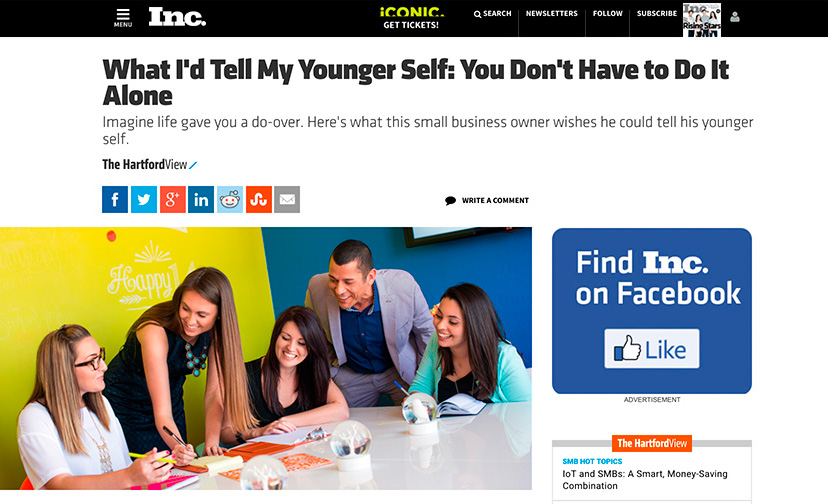What I’d Tell My Younger Self: You Don’t Have to Do It Alone (2017)
Inc.com
Imagine life gave you a do-over. Here’s what this small business owner wishes he could tell his younger self.
Entrepreneurship is as much about personal growth as it is about growing your business. You don’t get second chances, but there is a lot to gain from reflecting on past challenges. We spoke with small businesses about the biggest obstacles they have overcome and asked what they wish they could have done differently.
William Lopez, owner of Alternative Strategies, a full-service marketing communications firm in San Diego, California, never aspired to be an entrepreneur. He had a senior-level marketing and PR position with a big brand and wanted to join an agency. When he couldn’t find the right fit, he started his own, bolstered by encouragement from mentors and friends. The year was 2000. He was 27 years-old.
The roadblock
Within six months of launching, Lopez was moving to a bigger office. By 2008, he had an impressive list of clients, 11 full-time employees, and prime office space in a coveted downtown location.
Then came the financial crisis.
Lopez knew the importance of a diverse client portfolio. His agency serviced a large number of businesses–the problem was, 75 percent of them were in real estate. Within a three-month period, he lost more than half of that business.
“I thought that my client list was diverse enough that I wouldn’t have to make drastic decisions or cuts should I lose a client or two. But no one had ever warned me that an entire industry could collapse,” he says.
What I should have done differently
Lopez’s struggles were not his fault. His first mistake was not realizing that. “There was a lot of taking personal responsibility for things that were out of my control,” he admits. “My advice to myself would be to realize I wasn’t going through it alone.”
If he could do it over, he would put less pressure on himself and try harder to enjoy the journey. He also wishes he had taken action quicker. He dragged his feet in making tough decisions, like downsizing and moving to a smaller, “not so great office.” Lopez points out that the downgraded space was in the same building where he had launched Alternative Strategies. He was literally back where he had started.
The business life lesson
By the end of the recession, Lopez realized that not only was he “not alone,” he had a built-in support network of entrepreneurs–his clients. “I was talking to business owners every day. So much of what I was hearing from them were things they thought they were going through on their own. I realized they didn’t get to talk to business owners every day, like I did,” he says.
Lopez saw a chance to bring people together. He began to host roundtables at his home in which small groups of business owners would speak openly about their struggles. Lopez had the foresight to suggest attendees email their questions in advance; that way he could read them out loud and let the inquirer stay anonymous. Participants opened up quickly and discussed everything from cost-savings tips to how to realize it is time to let someone go.
Alternative Strategies bounced back, and then some, by identifying a new focus area: restaurants. As the economy improved and people dined out more frequently, the restaurant industry became more competitive. Marketing was a way for restaurants to stand out and to create long-term relationships with customers that extended beyond a single dining experience. Lopez positioned his firm as experts in this area, and in turn, expanded his pool of potential clients. He also embraced emerging technologies and was quick to offer digital and social media marketing services. Today, Alternative Strategies represents more than 50 restaurants in San Diego and offers capabilities that didn’t even exist when Lopez started the firm.
And just as the business has grown, so has Lopez. He is more open and tries to recognize the difference between mistakes he can learn from and circumstances that are beyond his control. He still hosts the roundtables today and stays true to their original format. He says that seeing the relationships they have created and the impact they have had on small business owners, himself included, is both rewarding and inspiring.
